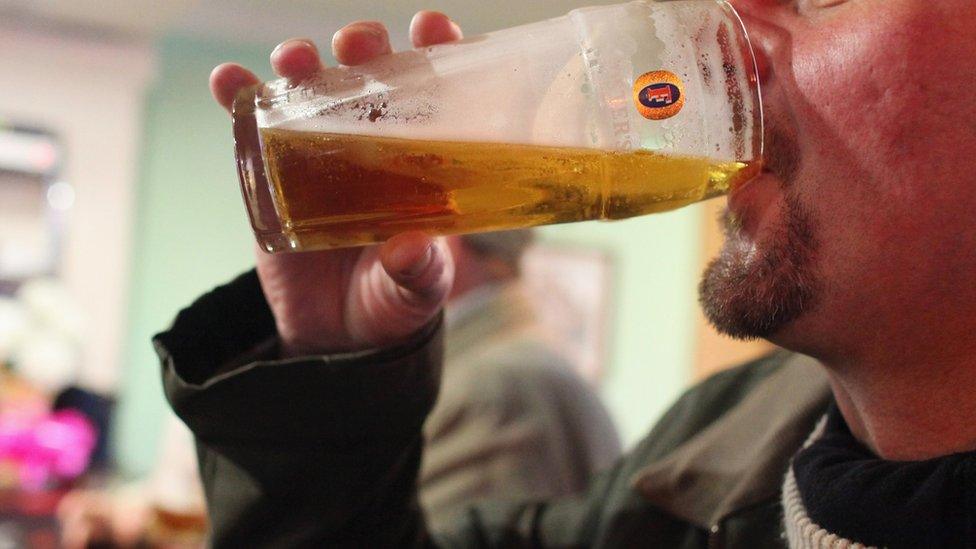Adults in Scotland drink almost 20 units a week
- Published
- comments

On average, each adult in Scotland drinks 19.6 units a week
More than 10 litres of pure alcohol was drunk last year for every adult in Scotland, a report on the nation's drinking has revealed.
The amount of drink sold was the equivalent to each adult drinking 19.6 units a week, NHS Health Scotland said.
The UK recommended limit is 14 units a week for men and women.
Lucie Giles, lead author of the report, said the research highlighted that alcohol was still a "significant public health concern".
Almost half (47%) of alcohol sold in shops and supermarkets last year cost less than 50p per unit - the new minimum unit price for drink which was brought in by the Scottish government in May.
Public Health Minister Aileen Campbell said: "Our world-leading minimum unit pricing policy now ensures no alcohol can be sold below 50p per unit. I am confident minimum unit pricing will make a significant difference to the harms shown in this report.
"Those that drink most heavily and live in deprived areas experience the greatest levels of harm, and they will benefit most from minimum unit pricing."
Scotland's Alcohol Strategy Monitoring Report found that across the country adults drank an average of 10.2 litres of pure alcohol per person last year.
And while more Scots are heeding the recommended drinking guidelines, over a quarter (26%) of people were consuming more than this.
Researchers said alcohol was now responsible for 22 deaths and 697 hospital admissions a week, with the rates of these more than eight times higher in Scotland's most deprived areas than they are in the most affluent communities.
More than 24,000 people were admitted to hospital for a drink-related condition in 2016-17, with a total of more than 36,000 in-patient stays recorded over the course of the year.
The scale of the problem means alcohol-related hospital admissions are 4.4 times higher than they were in the 1980s.
Alcohol-related deaths
Ms Giles, a public health intelligence adviser at NHS Health Scotland, said: "As a leading cause of illness and early death, alcohol consumption and related harm remains a significant public health concern.
"With rates of alcohol-specific deaths increasing in recent years, and alcohol-related hospital admissions four times higher than they were in the 1980s, it is more important than ever that we continue to monitor alcohol price, consumption and alcohol-related harms to inform and evaluate policy.
"Preventative action is necessary to reduce alcohol consumption if long-term improvements in alcohol-related harm are to be realised."
Ms Campbell said the report "sets out the significant levels of harm that individuals, families and communities experience through alcohol misuse, highlighting the increasing role that sales in supermarkets and off-licences play in Scotland's relationship with alcohol".
She added: "The total volume of alcohol sold in Scotland in 2017 is similar to the level sold in 1994.
"However, since 1994 we've seen a huge shift from people buying alcohol in pubs, clubs and restaurants, to buying in supermarkets and off-licences."